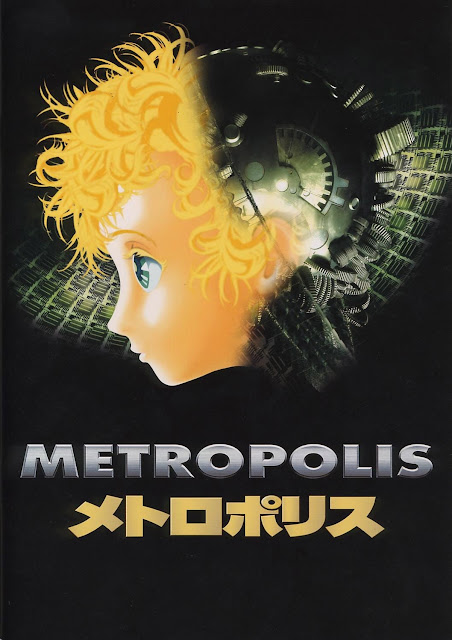Title: Metropolis
Year: 2001
Director: Rintaro
Country: Japan
Language: Japanese
Rintaro's Metropolis is based off of a very early work of the same title. Tezuka's sci-fi classic manga was drawn in 1949, when the man was just a young medical student. The title may remind you of Fritz Lang's classic silent movie,
which depicted the people's uprising and the android Malia, who played
the great part in the revolution, in a New York-like future city. Tezuka had not seen the movie at the time; instead still photos of
futuristic skyscrapers beautiful metallic androids inspired him to
create his vision of Metropolis.
The story is set in the far future where humans and robots live
together, unfortunately not in harmony. Many robots are forced
underground and are terminated for entering unauthorized areas. They are
more or less servants to humankind. The plot starts to unfold when the
boy meets a robot named Tima and they get into trouble.
Tezuka's Metropolis was very different from Lang's, and Rintaro's movie version is apparently very different from the Manga (at this time I have not read the manga). The film is gorgeous to look at. We are beholden to high-level computer artwork displaying an incredibly realized world
that accentuates a powerful, gripping story that will leave you thoroughly engaged. It is a fairly accessible film to a modern world audience, as much of its cultural references and homages are from sources outside of Japan. I was reminded of Dr.Strangelove, The Fifth Element, Blade Runner and many more American films.
Metropolis has a surprising amount of emotional depth. It surpasses even the more serious science fiction in trying to comprehend human nature, free-will, and sociological changes in society. It is ambitious in substance and style, but manages to be excel at both and become a true anime masterwork. I particularly loved the jazzy score, which would normally be off-putting in sci-fi, but this time proved to be fairly useful in emphasizing emotion.
The climax of Metropolis is guaranteed to leave you stunned. Rintaro's film is rather slow paced and drawn out, but at the same time he leaves you wanting more by the end. Despite a run-time of close to 2 hours, it feels like a much shorter film. It's difficult to say anything negative about this work of art, as I was I found myself incredibly inspired by it.


No comments:
Post a Comment